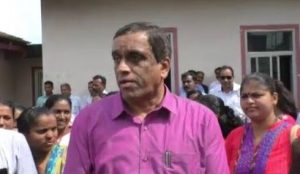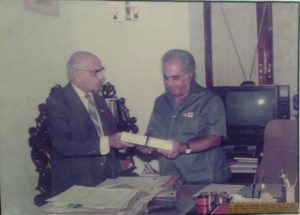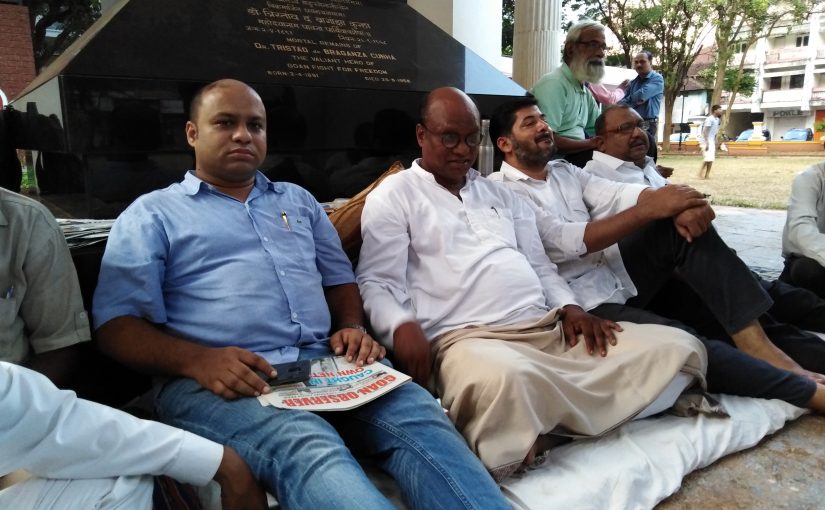ULTIMATUM: NGOs and political parties led by RTI Activist Rajan Ghate who has been fasting for the return of governance to Goa marched to the Chief Minister Manohar Parrikar’s house in Dona Paula. They demanded that the ailing Parrikar should either resign or handover charge to some other minister
BY RAJAN NARAYAN
Given the murky and extremely corrupt politics in Goa the state is better off under honest bureaucrats like the late JC Almeida or green governors like the late Lt Gen Jacob who created the Netravali and Mhadei sanctuaries
Contrary to the vehement insistence by Bharatiya Janata Party (BJP) President Vinay Tendulkar and IT Minister Rohan Khaunte, officials do a better job of governing than mantris. Provided the ministers in-charge of the departments allow them to perform their duties honestly and go by the rule book.
Not just Rohan Khaunte, who made the frustrated comment that bureaucrats of departments under Chief Minister Manohar Parrikar were “misusing” the absence of the ailing leader and stalling government schemes, but all the mantris in Manohar Parrikar’s cabinet are extremely unhappy over the delay in movement of files. They are unhappy because the babus will not dance to their tunes. The babus will not permit them to do anything illegal.
For ministers the whole point of becoming a member of the Cabinet is to bend and break the rules for the benefit of the people of their own constituency and more importantly for themselves. For instance when tenders are issued ministers often will not allow them to be cleared even if they are the lowest and the best if they do not get their cut. How else can we explain monstrosities like the so-called concretised Dona Paula road which took almost a decade to complete?
All you need to do is to take a passing glance at the report of the Comptroller and Auditor General of India (CAG) to see how ministers, often in collusion with officials, bend and break the laws to make money for themselves and sabotage projects in the public interest.
As we pointed out earlier, Cabinet ministers have no real power. They derive their power from the chief minister. They hold office at the pleasure of the chief minister and are accountable to him. The situation of course is much worse in the case of the present BJP alliance government in Goa headed by Manohar Parrikar.
Manohar Parrikar clearly is too sick to carry out his duties as chief minister. Unfortunately for Goa and his Cabinet colleagues, Parrikar holds all the key portfolios like Finance, Home and Administration. This means that unless he endorses or initials the file or proposal made by the Cabinet minister, money will not be released. The ministers do not have access to Parrikar. The MLAs do not have access to him either. Parrikar claims to be running the government through two key bureaucrats — Krishnamurthi who is Principle Secretary to the Chief Minister and Chief Secretary Dharmendra. Of the two, Krishnamurthi, who was with him for a long time, including during Parrikar’s stint in the Defence Ministry, appears to enjoy the total confidence of the chief minister.
The only other official who seems to have access to the chief minister is Rupesh Kamat, his personal assistant. Whether they are faithfully conveying the directions of the chief minister or twisting them to suit their purposes no one knows. The doubts arise from the fact that even non-controversial projects are held up. We cannot imagine why the tender for the cleaning of the beaches was delayed and the beautiful beaches of Goa are covered in garbage rather than sand at the beginning of the season!
The big mystery is the health and fitness of Chief Minister Parrikar who holds 30 portfolios. Can he think, can he read, can he walk, and can he sign? Nobody knows because there is no medical bulletin. Even when he was taken from his ICU residence to the GMC for an MRI he was carried on a stretcher indicating that he certainly can’t walk. The pictures released some time ago only confirmed that Parrikar is not fit to govern.
Bureaucrats, particularly those belonging to the Indian administrative service, are generally very honest and hardworking. We must make a distinction between the promoted and the direct recruits. The former are State Civil Service Officers who are promoted to the IAS and may tend to be corrupt because they have been very close to people in power and politicians from all parties. The direct recruits who are from the Union Territory cadre have produced some of the best officials in the country, many of whom have been posted in Goa at some time or the other.

There is the example of Pradip Baijal, who went on to become the secretary of the Telecom Commission. There was Jai Krishna who was chief secretary of Goa who went on to hold several important positions at the Centre. There was Shrivastava, a former police officer, who was one of the most efficient chief secretaries of the state. The last outstanding chief secretary the state had was J P Singh, who was earlier collector of Goa when he was just starting his career as an IAS officer.
The best example of honest officials is the first Goan chief secretary of liberated Goa, Dr J C Almeida. When Goa was liberated Dr Almeida was the equivalent of the finance secretary of the Portuguese colonial government. Along with some other officials he was absorbed into the IAS. After holding several portfolios he achieved the highest honour of becoming the first Goan secretary of Goa.
Significantly he has been the only Goan chief secretary of Goa because after the completion of his tenure, all the chief secretaries have been from outside the state. Not that Goans did not enter or pass the IAS exam.
We have the case of Arvind Bhatikar who was recruited as a lecturer in Economics in the Dhempe College of Art and Science during the Opinion Poll. The Dempo management was supporting the MGP which wanted merger with Maharashtra. Since Bhatikar opposed the merger of Goa with Maharashtra he was sacked. He went back to his research in Bombay University, appeared and passed his IAS, but chose or was allotted the Tamil Nadu cadre. Bhatikar only spent the last 10 years of his IAS career in Goa as the chairmen of the MPT.
Then we have the legendry Alban Couto who was the development commissioner after Liberation. He went on to join the Commonwealth secretariat in the UK. Police officers who worked in Goa have occupied senior positions in the intelligence agencies like CBI and RAW.
To come back to the first Goan chief secretary of Goa Dr J C Almeida, whose first death anniversary falls on November 28, 2018, I would like to provide two examples of his tremendous integrity. Virtually after he retired, Dr Almeida was asked to set up the Economic Development Corporation (EDC) to provide funds to those who might want to start industrial units in Goa. When he was chairman he was pressurized by one of the politicians in power to lease or sell the Goa Antibiotics and Pharmaceutical companies Ltd (GAPL) to a corrupt marwadi from Mumbai. Luckily for Dr Almeida the person chosen for the post of managing director of GAPL happened to be a very honest senior manage from the private sector called G L Gidwani. The senior manager who had earlier worked for the Birlas and had been the chief legal officer of HDFC was a man with a conscience. Gidwani discovered that the industrialist was not interested in running the company or turning it around to make a profit. On the contrary the industrialist was systematically stripping the assets of the company.
Being a good friend of mine he came to meet me very worried and sought my advice on what he should do. He wanted to approach the then chairmen and MD of EDC and make him aware of what is happening. He was not worried about his job or the benefits he was getting from the crooked industrialist. His only worry was whether Dr J C Almeida was also involved in the scam.
I assured him that Dr J C Almeida was an impeccably honest officer and must have been taken for a ride or acted under pressure. That he would not be a party to the destruction of a company in which EDC has a substantial stake. So I arranged a meeting between Gidwani and JC Almeida who were not friends. Almeida was shocked and immediately terminated the contract with the Mumbai party to whom GAPL had been leased. As a reward for his honesty he appointed Gidwani as the MD of GAPL. This was the only time the GAPL made a profit since it was started. I understand that it is back in the red.
One more example would suffice to dramatise how good officials are much better then corrupt politicians. Till the ‘80s Goa did not have its own Public Service Commission because it was not a State. All the recruitment for senior officials to run the Goa government was made by the Union Public Service Commission. Which is why till a decade ago the over whelming majority of the officials of the Goa civil service cadre were outsiders. In fact, many of them have returned to the state after being promoted to the IAS. After Goa became a state, the first chief minister after statehood, Pratapsingh Rane, asked J C Almeida to set up the Goa Public Service Commission which in future would recruit all the staff required by the government of Goa, including senior and junior officers of the Goa civil cadre. The Goa civil cadre came into existence and was created by Dr J C Almeida.
Dr Almeida wanted to set an example of how the GPSC would be a model of honesty and more importantly transparency. There was no question anybody paying money for jobs or any influence to get jobs in the government. Dr Almeida started with himself. To begin working he needed a secretary for himself. So he conducted a written exam to choose a secretary to the chairman of the GPSC. After the examination and announcement of the results he distributed all the answer sheets to all the candidates so that they should have no doubt that those chosen were on merit.
Even after his retirement Dr Almeida continued to be very concerned about the functioning of the government. His obsession or specialisation was the budget. Every year the day after the budget he would come to my office in the Herald and later the Goan Observer. He would borrow the detailed budget documents and do a masterly analysis of what was hidden under all the figures presented in the budget. Dr Almeida would spot a scam by merely looking at the figures in the budget or the CAG report which reviewed the performance of all government departments and companies.
For many years J C Almeida lived a middle class life in part of the premises which now houses Wendell Rodericks’ studio. It was only much later that he shifted to the La Campala colony where he was our neighbour when our office was in the Tropicana apartments. He was a source of great inspiration to us in the Goan Observer. Those were the days before the first

pay commissions and people were not paid huge amounts like they are now.
With his obsession with honesty Almeida lived a very unpretentious life. Fortunately for him all his five children managed to find jobs abroad. J C Almeida stayed alone with his wife in the house he built in the La Campala colony. Even in his ‘80s he used to drive about in his Vintage Premium Padmini. I recall spending some time with him when it was clear that the end was near. Even then J C Almeida, as always, was the perfect host. He was part of the old Portuguese generation who consider it very important to be gracious to guests. Despite his illness he would get up and pour me a drink and even insisted on walking me to the door. Goa would be much better of under a chief secretary like the late J C Almeida than a sick chief minister like Manohar Parrikar and all the wolves who are waiting for him to step down so that they can grab the kodel.
The only other time Goa had excellent governance was when there was spell of President’s rule, when a senior BJP leader Lt Gen Jacob, ironically a Jew, was the boss. General Jacob was the hero of the Bangladesh war when India inflicted a humiliating defeat in Pakistan with General Niyazi and more than one lakh soldiers, surrendering to Gen Jacob. If Netravali and Mhadei are wild life sanctuaries today it is because of the joint efforts of Richard D’Souza, the Goan Indian Forest Service officer and Governor Jacob who was ruling Goa during the spell of President’s rule.
